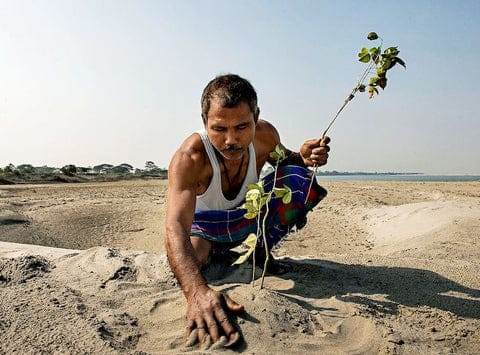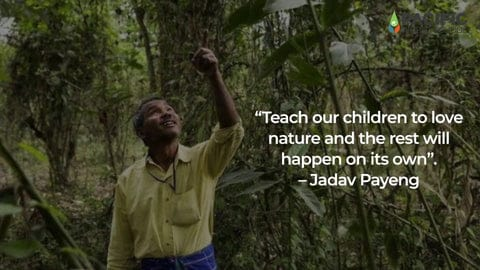In
1979 at the age of 16 extraordinary environmental activist Jadav "Molai" Payeng came across a large number of snakes that got washed away by a flood onto a treeless sand bank and had died due to excessive heat.
Experts claimed that within 20 years, this area could be completely washed away. Trees are a great natural way to prevent flooding, as the raindrops stay on the leaves and are evaporated back into the air. Therefore, less water reaches the ground. Tree’s also can absorb 120 gallons of water during a drought. In an area with unlimited water there are records of trees absorbing as much as 150 gallons of water in a single day. This cycle of precipitation, evaporating, condensation and then again precipitation, or rainfall is what keeps these eco-systems thriving as they will have a continuous cycle of water.
Jadav was so
concerned by what was happening that he started planting trees, all on his own on a around the sandbar of the river Brahmaputra,in Majuli Island in Northen India, the largest river Island on Earth.
Jadav left behind his formal education to give all his
attention to the forest. The son of a buffalo trader, Jadav grew up a
poor farmer from a marginalized tribal community in Assam, India.Jadav
continued to plant over the next 40 years and has single-handedly
created a flourishing forest with its own eco- system that covers 1,390 acres bigger than New York’s Central Park.
Jadav began by planting bamboo and then moved onto other species. At
first planting trees was time consuming until the trees started
providing the seed themselves. As his forest grew dense, so did the
amount of inhabitants. Wildlife experts say the forest now attracts 80% of the world’s
migratory birds and houses Bengal tigers, Indian rhinoceros, over 100
deer and rabbits, monkeys, and a herd of around 100 elephants visit the
forest every year.
His endeavours went entirely
unnoticed for decades,. and his dedication was only discovered
in 2007 when a photojournalist stumbled upon Payeng and discovered him seeding
his forest and wrote an article about him. He soon gained the attention
of the Indian government and then the entire country — winning multiple
awards for his incredible achievements.
Despite his tremendous effort Jadav does not take credit for the
flourishing forest, instead crediting ‘the birds, cows, deer, wind,
water and elephants (that) have helped me.’
Speaking to how his forest has effected the eco-system Jadav proudly
says that ‘people want to know my story. I tell them I just plant trees,
and I’d like all of you to do so.’
‘Trees are the lifeline of the forest. They don’t just give us shade
and oxygen. They feed birds and animals and balance our eco system. If
there is no life left, what is the use of all the advancements we have
made?’
After all this hard work the forest is now in danger, Jadav's worst fear for his forest is deforestation for financial gain,
which makes the flora and fauna vulnerable to human greed. He believes
all species on this planet are animals, including humans, and that
humans don’t realize that frugality and honoring nature is key to our
survival. Jadav says “The threat now comes from man who would destroy the forest for economic gain.’ he continues "There are no monsters in nature, except for humans.”
Jadav plans to plant 5,000 more acres of trees on Majuli to create a
500-mile stretch of flora on the banks of Brahmaputra River.
Known popularly today as 'The Forest Man of India' to honor Jadav for his environmental activism and for planting one tree
every day, the forest was named "Molai" after him. Jadav's story also
inspired a children's book, Jadav and the Tree Place, that
tells his story of how he made a forest that is now home to wild
animals.
Speaking to how his forest has effected the eco-system Jadav proudly
says that ‘people want to know my story. I tell them I just plant trees,
and I’d like all of you to do so.’
‘Trees are the lifeline of the forest. They don’t just give us shade
and oxygen. They feed birds and animals and balance our eco system. If
there is no life left, what is the use of all the advancements we have
made?’
Since his story went viral in 2012, Jadav has travelled around the
world speaking in schools and attending conferences on climate change
and environmental issues and has revolutionised the movement towards reforestation and tree plantation.
He has been the subject of many documentaries and now
people travel across the globe to see the Molai forest. An amazing story that reminds us that sometimes the problem of climate change seems too large to tackle alone,
but Jadav is the perfect example of how one person can make a
difference to the eco-system around them.
The critically acclaimed Forest Man a 2013 documentary short, tells of Jadav’s continued endeavours in environmental activism. Compassion and empathy towards nature
and its beings is what Jadav follows and lives by. Payeng who put the forest above his own needs in 2015 was honored with Padma Shri, the fourth highest civilian award in India.
Jadav believes that if developing countries take necessary efforts to
protect the environment, the world's natural balance will be restored. He has also asked UNESCO members that we should compel
residents to take good care of the environment and support
reforestation for future generations, if we accomplish this, the world
will be a happier and healthier place to live. Here’s to many more environmental heroes like Molai Payeng and their efforts to save the planet for all of us!

